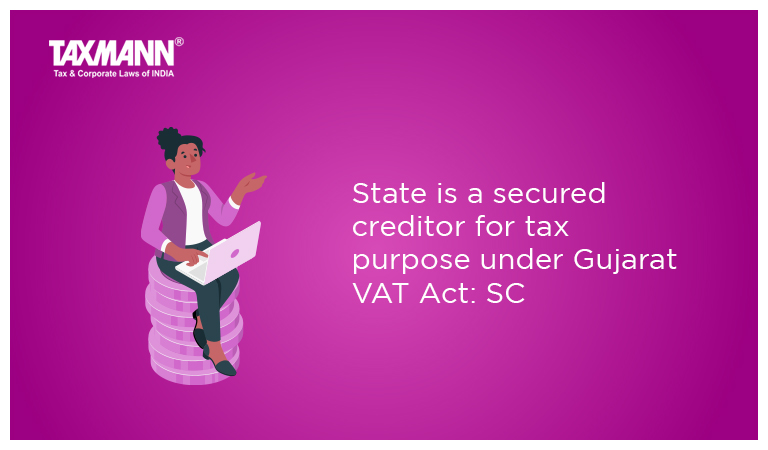State is a secured creditor for tax purpose under Gujarat VAT Act: SC
- Blog|News|Insolvency and Bankruptcy Code|
- 2 Min Read
- By Taxmann
- |
- Last Updated on 9 September, 2022

Case Details: State tax officer v. Rainbow Papers Ltd. - [2022] 142 taxmann.com 157 (SC)
Judiciary and Counsel Details
-
- Indira Banerjee & A.S. Bopanna, JJ.
Facts of the Case
The National Company Law Appellate Tribunal (NCLAT) held that the Government can’t claim first charge over the property of the Corporate Debtor. The NCLAT also held that Section 48 of the Gujarat Value Added Tax (GVAT), 2003, which provides for first charge on the property of a dealer in respect of any amount payable by the dealer on account of tax, interest, penalty etc. under the GVAT Act, 2003 can’t prevail over Section 53 of the IBC.
The State Tax Officer (appellant) filed appeal before the Supreme Court and the question before the Apex Court was –
“Whether the provisions of the IBC and, in particular, Section 53 thereof, overrides Section 48 of the GVAT Act?”
Supreme Court Held
The Honorable Supreme Court observed that as per the Section 48 of the GVAT Act, the claim of the Tax Department of the State, squarely falls within the definition of “Security Interest” under Section 3(31) of the IBC and the State becomes a secured creditor under Section 3(30) of the Code.
If the Resolution Plan ignores the statutory demands payable to any State Government or a legal authority, altogether, the Adjudicating Authority is bound to reject the Resolution Plan; the Apex Court concluded. The Court further held that the NCLAT clearly erred in its observation that Section 53 of the IBC over-rides Section 48 of the GVAT Act. The Committee of Creditors, which might include financial institutions and other financial creditors, can’t secure their own dues at the cost of statutory dues owed to any Government.
Therefore, the resolution plan and the impugned orders were liable to be set aside and the appeal was allowed.
Disclaimer: The content/information published on the website is only for general information of the user and shall not be construed as legal advice. While the Taxmann has exercised reasonable efforts to ensure the veracity of information/content published, Taxmann shall be under no liability in any manner whatsoever for incorrect information, if any.

Taxmann Publications has a dedicated in-house Research & Editorial Team. This team consists of a team of Chartered Accountants, Company Secretaries, and Lawyers. This team works under the guidance and supervision of editor-in-chief Mr Rakesh Bhargava.
The Research and Editorial Team is responsible for developing reliable and accurate content for the readers. The team follows the six-sigma approach to achieve the benchmark of zero error in its publications and research platforms. The team ensures that the following publication guidelines are thoroughly followed while developing the content:
- The statutory material is obtained only from the authorized and reliable sources
- All the latest developments in the judicial and legislative fields are covered
- Prepare the analytical write-ups on current, controversial, and important issues to help the readers to understand the concept and its implications
- Every content published by Taxmann is complete, accurate and lucid
- All evidence-based statements are supported with proper reference to Section, Circular No., Notification No. or citations
- The golden rules of grammar, style and consistency are thoroughly followed
- Font and size that’s easy to read and remain consistent across all imprint and digital publications are applied



 CA | CS | CMA
CA | CS | CMA
